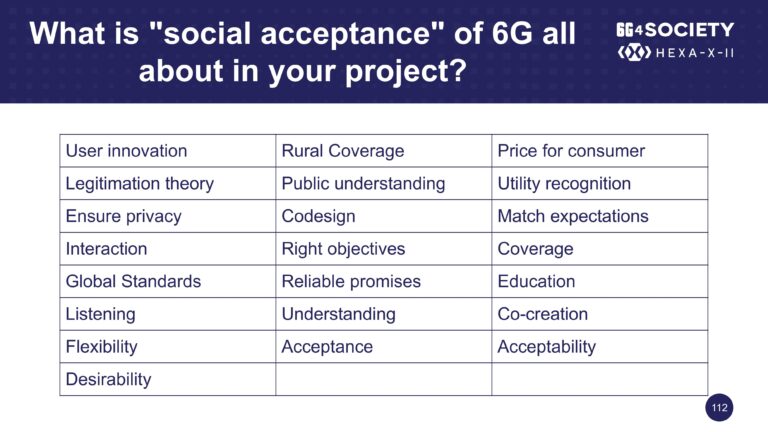Shaping a Sustainable Future for 6G: Social Acceptance in Focus at 6G4Society & Hexa-X-II Webinar
The joint webinar, “Ensuring 6G Social Acceptance” hosted on 6 November 2024 by 6G4Society and Hexa-X-II, brought together experts to explore how societal values should shape the development of 6G networks. Moderated by Dr Monique Calisti, the 6G4Society Project Coordinator from Martel Innovate, the event underscored the importance of social acceptance and sustainability as foundational elements of 6G. Presentations focused on ethical and community-oriented approaches to technology, with Monique also presenting results from participant polls held throughout the webinar. This collaborative effort by 6G4Society and Hexa-X-II highlighted the commitment to building a 6G network that is inclusive, sustainable, and socially accepted.
Opening Session: Social Acceptance and Sustainability of 6G
Pavlos Fournogerakis and Chiara Mazzone from the Smart Networks and Services Joint Undertaking (SNS JU) opened the webinar with the session titled “Societal Acceptance and Sustainability of 6G.” They outlined the importance of integrating societal and environmental values into the very core of 6G development and highlighted the role of Key Value Indicators (KVIs) as a crucial framework for measuring and promoting these principles. KVIs represent a significant opportunity for Europe to influence stakeholders’ views on acceptance and sustainability, ensuring that 6G aligns with societal goals. Together, they emphasised the SNS JU Office’s commitment to fostering public trust and gave an overview of the SNS JU’s portfolio. The main takeaway was that embedding sustainability and inclusivity from the start is essential for the successful adoption and rollout of 6G.
Session 2: Introduction to the 6G4Society and Hexa-X-II Projects
Following the opening session, Eva Hajdok from Martel Innovate and Mikko Uusitalo from Nokia introduced the 6G4Society and Hexa-X-II projects, discussing the vision and goals driving these initiatives. They shared how both projects are pioneering approaches to integrating social acceptance, ethical considerations, and sustainability within 6G. The takeaway from this session was that collaborative efforts are paramount to ensure that 6G serves diverse communities effectively and responsibly.
Session 3: Building a Social Acceptance Model for 6G
Margot Bezzi from CyberEthics Lab. presented the “Social Acceptance of Technology” framework, aiming at exploring the relationship between technology impact, values, and social acceptance in the context of 6G technology. Her presentation also underscored the importance of building public trust and ensuring transparency throughout the development process. The key takeaway from Margot’s session was the necessity to understand acceptance as something that goes beyond user-technology relationships and user experience and that depends on the values that are prioritised by different social groups and stakeholders.
Session 4: Survey Results on 5G
Maurizio Cecchi and Ishita Mishra from the Institute P.I.I.U. shared insights from past surveys on 5G, discussing how lessons learned can inform the development of 6G. They highlighted findings on public concerns surrounding privacy, accessibility, and safety, demonstrating how 5G experiences serve as a guide for addressing similar issues in 6G. The main takeaway was that leveraging 5G learnings provides a strong foundation for fostering public acceptance of the next-generation network.
Session 5: Preliminary Results from the 6G4Society Citizen Survey
Flavia Maragno from Digital for Planet shared the preliminary results from the 6G4Society Citizen Survey, which gathered public opinion on 6G expectations and concerns. Her presentation emphasised citizens’ calls for sustainable, secure, and ethical technology. The main takeaway was that involving citizens early in the conversation about 6G can guide its design, ensuring the technology remains relevant and responsive to public needs.
Session 6: Insights from Civil Society and Business
Louise Renoux from Orange introduced the “Societal Dialogue” approach, designed to engage internal and external stakeholders on the future of networks. Inspired by participatory democracy, it seeks to gather feedback from society, focusing on the role of networks and digital technologies in the future, while considering awareness of environmental and social challenges. By involving non-experts to envision the future, she emphasised moving beyond a purely technological approach, allowing telecom players to better understand and address civil society’s needs.
Participant Polls
Throughout the webinar, moderator Monique Calisti and webinar coordinator Sophie Staheyeff (Digital4Planet) engaged participants with interactive polls, gathering real-time feedback on social acceptance priorities for 6G. These responses were summarised at the end of the event, showing shared concerns around privacy, sustainability, and the importance of inclusive technology.



